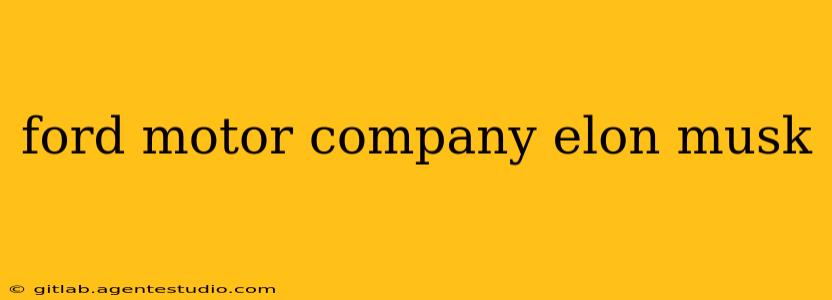The names Ford Motor Company and Elon Musk might seem worlds apart. Ford, a century-old automotive giant representing American manufacturing prowess, and Musk, the visionary CEO of Tesla and SpaceX, pushing the boundaries of electric vehicles and space exploration. Yet, their paths have unexpectedly intertwined, sparking debate and speculation within the automotive industry. This exploration delves into the points of intersection and the implications for both companies.
The Competition Heats Up: EVs and the Future of Mobility
The most obvious point of convergence is the electric vehicle (EV) market. While Ford has a long history of internal combustion engine (ICE) dominance, it's aggressively pursuing electrification to compete with Tesla's market leadership. Ford's Mustang Mach-E and F-150 Lightning represent significant strides in this direction, directly challenging Tesla's Model Y and Cybertruck (when it finally launches). This competition pushes both companies to innovate faster, leading to advancements in battery technology, charging infrastructure, and overall vehicle design.
Different Approaches, Shared Goals
Despite the rivalry, both companies share the overarching goal of transitioning towards a sustainable transportation future. However, their strategies differ significantly. Ford, with its established manufacturing infrastructure and vast dealer network, adopts a more incremental approach, leveraging existing strengths while gradually integrating EVs into its lineup. Musk, on the other hand, prioritizes radical innovation and direct-to-consumer sales, prioritizing disruption over gradual evolution.
Beyond EVs: Innovation and Disruption
The intersection extends beyond EVs. Both Ford and Musk are exploring autonomous driving technology, albeit with different focuses. Ford is emphasizing a more gradual rollout of driver-assistance features, aiming for a safer and more practical implementation. Tesla, meanwhile, is known for its ambitious fully autonomous driving (FSD) program, which, while generating significant buzz, also faces scrutiny regarding safety and reliability.
The Battle for Talent
The competition also extends to attracting and retaining top engineering and software talent. Both companies are aggressively recruiting skilled professionals in areas like artificial intelligence, machine learning, and battery technology. The battle for talent underscores the importance of innovation and the high stakes involved in the automotive industry's transformation.
The Future of the Ford-Musk Dynamic
Predicting the future trajectory of the relationship between Ford and Musk is challenging. While direct confrontation is likely to continue in the EV market, opportunities for collaboration cannot be entirely ruled out. For example, both companies may benefit from collaborative efforts in areas like battery technology development or charging infrastructure expansion. However, the fundamental differences in business models and corporate cultures suggest that outright partnerships remain unlikely in the foreseeable future.
The Consumer Benefits
Ultimately, the competition between Ford and Musk benefits consumers. It drives innovation, accelerates the development of better EVs, and pushes both companies to offer more competitive pricing and features. This ongoing rivalry ensures a dynamic and rapidly evolving automotive landscape, shaping the future of mobility for years to come.
Author Note: This analysis is based on publicly available information and industry insights. The automotive industry is constantly evolving, and future developments may alter the dynamics described above.

